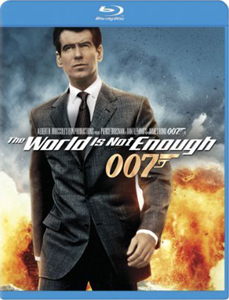With “No Time to Die” coming out in November, I’m looking back at the eight modern-era James Bond films from the perspective of a newcomer, from July 11-26. Next up is 19th Eon-produced film and third starring Pierce Brosnan, “The World is Not Enough” (1999):
OVERALL THOUGHTS
Director Michael Apted’s lone “Bond” entry is a noticeable step backward from the first two Brosnan installments — through no fault of Brosnan, who is still great, as are several action sequences. The convoluted story about nuclear terrorists leaves a viewer’s mind even when watching it. The closest thing to social commentary is that the villain is an oil baroness, but that’s a device rather than a theme.
TITLE/SONG
“The World is Not Enough” is performed by Garbage, and in music context it’s a tragic love song. I assumed the phrase would represent the villain’s position: that he or she isn’t content to merely rule the world. But as it turns out, it does relate to a romance story: Elektra tells Bond she could’ve given him the world, and he says “the world is not enough” … to put up with someone so twisted, presumably.

“The World is Not Enough” (1999)
Director: Michael Apted
Writers: Neal Purvis, Robert Wade (screenplay/story); Bruce Feirstein (screenplay)
Stars: Pierce Brosnan, Sophie Marceau, Denise Richards
BOND GIRLS
We learn a fascinating backstory about Elektra King (Sophie Marceau): She loves her co-conspirator and former kidnapper Renard as a result of Stockholm syndrome, picking him over even James Bond. But Marceau – although easy to admire on screen — doesn’t play Elektra quite crazy enough for it to ring true.
The not-evil Bond Girl here is Christmas Jones (Denise Richards), a nuclear-weapon deprogrammer who eschews all men’s advances but is of course in Bond’s arms at the end. Richards reads lines more so than acts, and it’s not a good sign for this franchise that it couldn’t get someone better. But it should be pointed out that the role is poorly written; almost all of Jones’ lines are expositional.
“TWINE’s” women are in a no-win situation, coming on the heels of James’ genuine bond with Wai Lin in “Tomorrow Never Dies.” That’s not mentioned here, so we can presume they parted ways between films, as fits with Bond’s character. But it’s strange that Bond (supposedly) doesn’t care about his conquests, yet Elektra quite accurately taunts Bond about not being able to kill her.
VILLAINS
Like Elektra, Renard (Robert Carlyle) has an unusual backstory on paper: From a previous encounter with authorities, he has a bullet lodged in his head that is slowly killing him. But until it does, he’s impervious to pain. The story doesn’t do much with this, though.
BEST ACTION SCENE
Bond and Elektra (before she’s revealed as evil) are dropped off by a helicopter and they ski down snowy mountains where no skis have touched before. Then they are pursued by ingenious vehicles called parahawks — snowmobiles that can unleash parachutes and fly with an air-fan engine. At one point, a parahawk goes over a cliff, Bond delivers a farewell pun, and then it deploys a chute and returns to the action.

MOST RIDICULOUS MOMENT
The most ridiculous moment occurs in the preproduction phase when Richards is cast not in the one role she’d be perfect for – an aspiring actress who can’t act and who becomes one of Bond’s string of conquests. Instead, she’s cast as an honest-to-god nuclear scientist.
BEST GADGET
Similar to the enemy’s parahawks, Bond drives a vehicle that can switch on the go from a jetski to a mini-sub to a street vehicle. Q tells him it’s not ready, but it clearly is – although Q may have been saying that because he intended to keep it as a retirement present to himself.
Speaking of the gadget-maker, this is Desmond Llewelyn’s last film; he died later in 1999. He’s great, but the handoff is also worth cheering for: Comedy master John Cleese takes over as new quartermaster R.
SEXUAL/GENDER POLITICS
In the abstract, the idea of a seemingly ditzy woman being a nuclear scientist sends the message that people can be anything they want to be, that they don’t have to conform to stereotypes society places on them.
Again in the abstract, this is brave against-type casting. In reality, Richards is distracting by being so unbelievable in the role. I somehow don’t even believe that she’d sleep with James Bond. Even though we’re shown otherwise, Christmas Jones doesn’t seem capable of doing anything other than taking directions.
A more positive spin on the “women can do anything” (for better or worse) theme comes from the troubled Elektra, who opts to be a supervillain, and Bond’s boss M (Judi Dench), who holds her own when plucked from her MI6 office and thrown into the field.
CRINGIEST ONE-LINER
My friend Michael told me “TWINE” features the cringiest pun of the series, but after two hours of Bond groaners, I didn’t find one that stood out. And then, just before the credits roll, we learn why the writers couldn’t resist calling Richards’ character Christmas Jones:
Bond (engaged in sexual intercourse with Christmas): “And I thought Christmas only came once a year.”
Bond reviews
Saturday, July 11: “GoldenEye” (1995)
Sunday, July 12: “Tomorrow Never Dies” (1997)
Wednesday, July 15: “The World is Not Enough” (1999)
Saturday, July 18: “Die Another Day” (2002)
Sunday, July 19: “Casino Royale” (2006)
Wednesday, July 22: “Quantum of Solace” (2008)
Saturday, July 25: “Skyfall” (2012)
Sunday, July 26: “Spectre” (2015)

